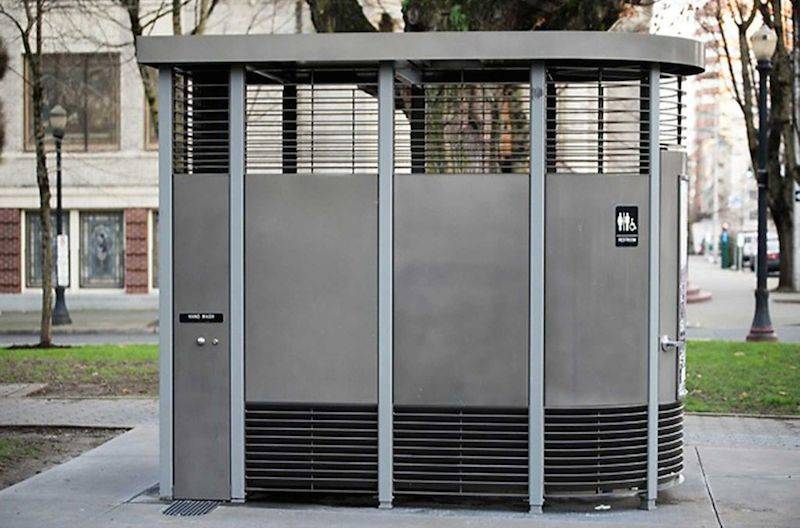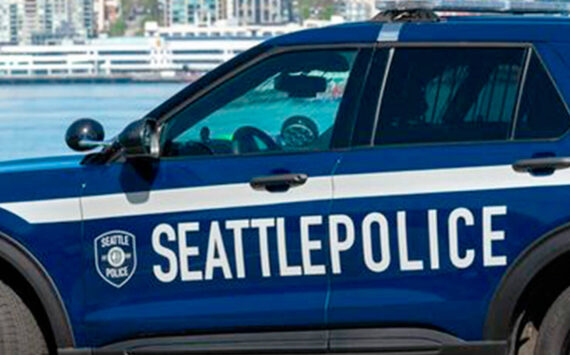Back in 2015, if you’d asked what would come first, a public bathroom in Pioneer Square or an income tax in Seattle, you’d be forgiven for guessing the former.
After all, $300,000 in funding had been provided by the city of Seattle for the neighborhood to install a restroom, and there was even a model picked out: The famous Portland Loo, specially designed to give people a place to relief themselves without simultaneously creating a sex/drug den in the middle of a city sidewalk. It felt like a sure thing. “Our goal is to make it happen ASAP,” Seattle Department of Planning and Development’s Gary Johnson told the Seattle Times in May of 2015.
Two years on, though, an income tax is the law of the land—after a few months of public debate (not that that’s a bad thing)—and the toilet plans for Seattle’s oldest neighborhood have been flushed. Instead, it appears that Ballard and the University District will be getting the loos, while Pioneer Square figures out its next move.
“We fought about this really long and hard for five years and could not make any headway,” says Leslie Smith, executive director of the Pioneer Square Alliance. “We moved to other priorities.”
This is just the latest development in what’s proven to be a tortuous civic saga that shows how backed up things can get when neighborhood politics, homelessness, and sewer infrastructure converge.
“It’s a process that has been going on for a remarkably long time,” Johnson, with the planning department, tells Seattle Weekly today.
Back in 2004, Seattle spent $5 million to install five self-cleaning toilets throughout the city, including in Pioneer Square. They quickly became havens for garbage, drug use, and prostitution. In 2008, the city sold them on eBay for $2,500 each.
Others learned from our mistakes. Specifically, Seattle’s experience was keenly watched by our frenemies to the south in Portland when they designed their own public toilets.
“We really looked at Seattle as what not to do,” one Portland official told City Lab in 2012. What they came up with was the Portland Loo, which features graffiti resistant stainless steel walls and, more importantly, angled slats that allow police to look inside the toilets to see how many people are in there (though, designers insist, nothing else).
Things then came full circle when Mayor Mike McGinn announced in 2013—three years after neighbors in Pioneer Square set a public bathroom as a top priority for the hood—that the city planned to install a Portland Loo on the west end of the Sinking Ship parking garage.
Given Pioneer Square’s concentration of homeless services and proximity to the sports stadiums, neighborhood activists argued that a public toilet was necessary to cut down on the amount of people relieving themselves in alleyways and doorways.
“There is an ongoing need in many neighborhoods for safe, accessible public restroom facilities. One neighborhood in particular has been active and vocal about the need for this service—Pioneer Square,” the mayor’s office said in a press release in 2013.
McGinn’s plan called for a developer to buy and install the loo in exchange for a higher building allowance; that plan fell through, though, and in 2015 the city allocated $300,000 to fund the toilet itself. That’s when Johnson uttered those fateful letters to the Times: A.S.A.P.
Instead, the process got bogged down yet again.
“We convened a broad-based neighborhood stakeholder group. The group decided on the Portland Loo. They did a siting process, but ran into challenges with 100-year-old infrastructure and other challenges,” Johnson says.
In short, Johnson says: “Pioneer Square continues to be stalled.”
Smith, with the Alliance, says Pioneer Square’s infrastructure made installation costs prohibitive.
“It was going to be more than half a million dollars to purchase and install a Portland loo in Pioneer Square,” she says. “In Pioneer Square, you dig a hole, and everything is really old.”
She says the neighborhood was also turned off by a lack of commitment by the city to cover cleaning and maintenance costs.
“Pioneer Square didn’t feel like it should be the only neighborhood solely responsible for cleaning and maintaining a public restroom long term,” she says.
In contrast to earlier statements by neighborhood advocates that Pioneer Square is uniquely in need of a public bathroom, Smith now says that the neighborhood has more options than most for people needing to go: Both train stations, the Klondike Gold Rush museum, the ferry terminals, and other locations have public options. The missions also allow people to use their facilities. That said, she acknowledges a lack of bathroom access can be a hardship on the poor.
“Lower income people and homeless people need access to bathrooms and they should not have to spend four dollars on a cup of coffee to use a bathroom at Starbucks,” she says.
Both those sentiments—that there’s a need, and that Pioneer Square has options for when things get urgent—were echoed by people interviewed around the neighborhood Wednesday.
“I’ve seen some people just go to the bathroom on themselves,” says Daniel Crenshaw. “Some of them ain’t got a change of clothes, too. It’s a serious problem. … When are we getting a new mayor again?”
However, David Troy Henley, who is homeless, says “using the bathroom isn’t too big of an issue. … A lot of times you can use the bars at night.” He adds that he also frequents the Downtown Emergency Services Center and Bread of Life mission.
Henley says the problems with past bathrooms were serious. “They used to have port-a-potties around here, but they did away with them because people were smoking crack, doing drugs, and what was that other thing? Oh yeah, prostitution. They got rid of those.”
The restroom situation puts pressure on local businesses in Pioneer Square. Baristas at several coffee shops around the neighborhood said they are often asked by homeless people to use the bathroom. They all said they say yes unless the person has caused problems in the past, but added that a public option would be welcome.
Don’t count the loos out just yet. At this point, it appears Pioneer Square’s loss will be Ballard and the U District’s gain.
When the neighborhood “pulled the plug” on the Portland Loo, the council began looking elsewhere. It ended up adding another $300,000 to the original loo budget, so that both Ballard and the U District could install them.
Johnson says both neighborhoods have done “impressive” work in getting stakeholders and sites in place. “We’re moving forward with the intention of siting a loo in Ballard and the U District,” he says.
As for Pioneer Square, Smith says: don’t hold your breath.
“At this point in time, I don’t think we’re getting a Portland Loo anytime soon.”
dperson@seattleweekly.com
News intern Nathalie Graham contributed to this report.
A previous version of this story incorrectly stated that conversations are ongoing with Ballard and the U District about who would bear the cost of cleaning the loos. In fact, the city has allocated $36,000 to cover cleaning costs this year and next, according to Johnson.








